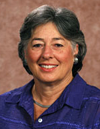Initiative brings public resources to
immigrants
The following article describes one of
many poster presentations set for this year’s faculty convocation Aug.
22. The Catalyst will highlight some of the presentations on MUSC’s
international clinical, educational and research opportunities and
outreach.South Carolina has the fourth fastest growing Latino and Hispanic populations in the nation. The increase in the number of these residents has been recent enough that the cultural norms and health beliefs of the Hispanic population are not well understood by health care providers.
 Dr. Deborah
Williamson
Dr. Deborah
Williamson“Language barriers, poverty, and cultural differences are associated with poorer utilization of preventive services, increased use of hospital emergency rooms, and less satisfaction with care among Hispanics,” said Deborah Williamson, DHA, who has spearheaded a number of initiatives seeking better ways to accommodate health care delivery for immigrant populations. “This growing Hispanic minority mandates creative approaches that address issues of access, quality, and satisfaction with health services.”
A group of Presidential Scholars led by Williamson and Laura Cousineau chose to look in depth at the health issues from both a human and a policy perspective. The work by the Presidential Scholars, from the 2005-2006 academic year summarizes misconceptions about immigration and its impact on South Carolina’s economy and resource utilization, as well as identifying facts about immigrant health status.
The poster, Immigrant Health In South Carolina: The cost of ignorance and exploitation in a volatile political climate, utilizes primary and secondary data sources to examine the health concerns of Latino immigrants, access to health services, and legislative initiatives in South Carolina relating to the provision of health services to immigrant populations. This focus was selected because of the growing Latino population in South Carolina.
“This growing Latino minority mandates creative approaches that address issues of access, quality, and satisfaction with health services,” Williamson said.
The Presidential Scholars project held special interest for Williamson, because she is the principle investigator on several grants focusing on improving health services to Latino families and developing cultural competence in the nursing workforce. Williamson noted that the grants have established a strong focus on Latino health within the College of Nursing and allow faculty to serve as a resource to the community and to health policy makers.
The authors of the poster included: Presidential Scholars: Amanda Jackson, Colin Ligon, Ben Neely, Drane Oliphant, Colleen O’Rourke, John Payne, Shonda Peterson, Cristina Reyes, Rachel Rosansky Faculty Advisors: Cousineau and Williamson.
Meanwhile, Williamson is involved with a program that seeks to develop cultural competence in the nursing workforce. The objectives of this program are to:
- Increase communication and cultural competence for nurses working with multilingual and multicultural populations in health care;
- Build cultural and linguistic awareness about the diverse Latino cultures and existing health needs through curriculum interventions; and
- Increase minority representation in nursing.
Friday, Aug. 18, 2006
Catalyst Online is published weekly,
updated
as needed and improved from time to time by the MUSC Office of Public
Relations
for the faculty, employees and students of the Medical University of
South
Carolina. Catalyst Online editor, Kim Draughn, can be reached at
792-4107
or by email, catalyst@musc.edu. Editorial copy can be submitted to
Catalyst
Online and to The Catalyst in print by fax, 792-6723, or by email to
catalyst@musc.edu. To place an ad in The Catalyst hardcopy, call Island
Publications at 849-1778, ext. 201.